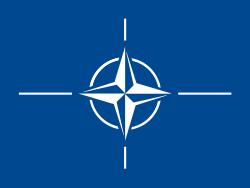| Permanent Representative of Italy to the North Atlantic Council | |
|---|---|
| Rappresentanza Permanente presso il Consiglio Atlantico in Bruxelles | |
 | |
| Style | His Excellency |
| Inaugural holder | Alberto Rossi Longhi |
| Formation | November 21, 1950 |
The Italian Permanent Representative to the North Atlantic Council is the Permanent Representative of the Italian government to the North Atlantic Council.
| Diplomatic accreditation | Permanent Representative | Observations | List of prime ministers of Italy | Term end |
|---|---|---|---|---|
| November 21, 1950 | Alberto Rossi Longhi | Minister Plenipotentiary and Ambassador | Ferruccio Parri | May 31, 1954 |
| June 1, 1954 | Adolfo Alessandrini | Amintore Fanfani | January 17, 1958 | |
| January 18, 1958 | Umberto Grazzi | Amintore Fanfani | May 8, 1959 | |
| May 9, 1959 | Adolfo Alessandrini |
| Antonio Segni | October 2, 1967 |
| October 3, 1967 | Carlo De Ferrariis Salzano | Giovanni Leone | January 15, 1971 | |
| January 22, 1971 | Felice Catalano di Melilli | Emilio Colombo | January 16, 1980 | |
| January 18, 1980 | Vincenzo Tornetta | (*He was born in Piazza Armerina (Enna) in 1917 )
| Francesco Cossiga | April 14, 1983 |
| April 14, 1983 | Sergio Romano (writer) | Bettino Craxi | September 18, 1985 | |
| September 19, 1985 | Francesco Paolo Fulci | Bettino Craxi | January 15, 1991 | |
| June 15, 1991 | Enzo Perlot | (*born on November 17, 1933, in Mezzolombardo)
| Giulio Andreotti | May 6, 1993 |
| July 26, 1993 | Giovanni Jannuzzi | (*Born in Rome, November 6, 1935 )
| Carlo Azeglio Ciampi | May 1, 1998 |
| May 2, 1998 | Amedeo De Franchis | (*born on 9 August 1939 in Naples)
| Massimo D’Alema | September 6, 2002 |
| September 7, 2002 | Maurizio Moreno | Silvio Berlusconi | February 22, 2007 | |
| April 12, 2007 | Stefano Stefanini | Silvio Berlusconi | December 1, 2010 | |
| December 12, 2010 | Riccardo Sessa | Silvio Berlusconi | December 31, 2012 | |
| January 21, 2013 | Gabriele Checchia | Mario Monti | September 19, 2014 | |
| October 1, 2014 | Maria Angela Zappia Caillaux | Minister Plenipotentiary | Matteo Renzi | March 6, 2016 |
| March 7, 2016 | Claudio Bisogniero | (* born in Rome, on July 2 1954) [4] | Matteo Renzi | April 12, 2019 |
| April 15, 2019 | Francesco Talò | (* born in La Spezia, on August 16, 1958) [5] | Giuseppe Conte | February 12, 2021 |